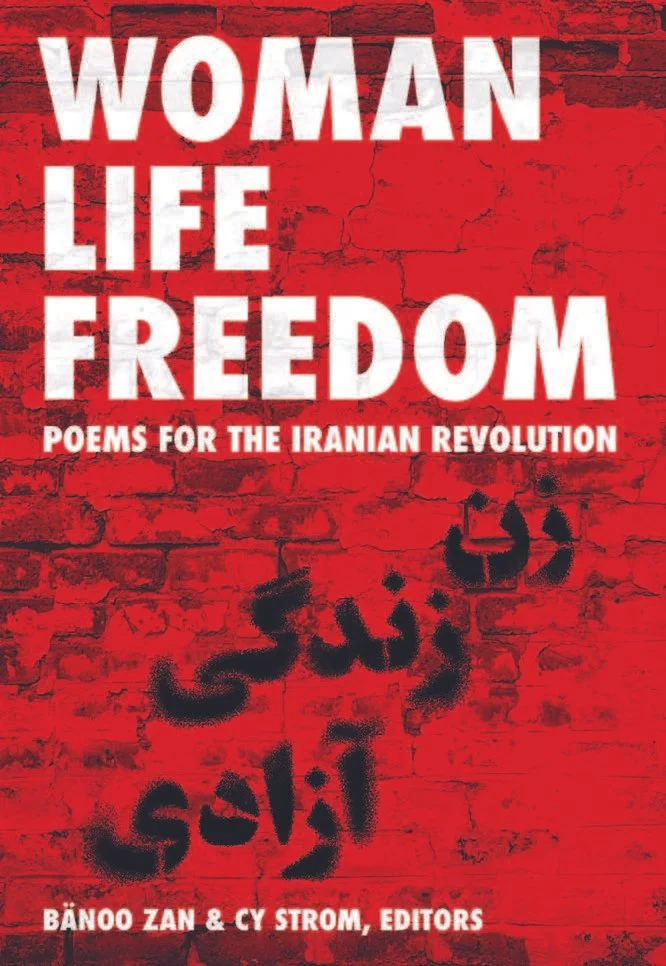Woman Life Freedom: Poems for the Iranian Revolution
Woman Life Freedom:
Poems for the Iranian Revolution
Edited by Bänoo Zan and Cy Strom
Guernica Editions, 2025; 135 pages; $25.00
Reviewed by Natasha Sanders-Kay
In September 2022, morality police murdered Mahsa Jina Amini. In the days after, massive protests broke out across Iran and the world, marking the revolution we know as Woman Life Freedom. This anthology was born amidst this momentum.
The introduction by Cy Strom situates the collection within Iran’s rich history of resistance through poetry. Exploring the origins of the chant “Woman Life Freedom!” (“Zan Zendegi Azadi!” in Persian; “Jin Jian Azadî!” in Kurdish), Strom describes the use of such slogans as “an artistic performance of revolt. . . a people’s art form,” and considers the question, “What is poetry ‘for’ a revolution?”
The poems that follow disturb and inspire, incite, and ignite. Motifs move throughout Woman Life Freedom: Poems for the Iranian Revolution, hair being the most immediate — “So soft yet so powerful,” writes Azita Sadri in “Fire,” wondering “[w]hether its thickness can be braided into ropes that we climb higher / than they can see. / Whether each strand can turn into the strings of a harp, forming a / choir that sings, / ‘Zan, zendegi, azadi!’” Other symbols include fruit, flowers, fire, and the colour red, like “the pomegranates in Iran / scarlet, garnet, ruby, blood, / dark and sweet and sticky like the sin / they tried to bleed out of us” (Ayda Niknami, “the pomegranate”).
Soft, hopeful messages are balanced with blunt rage. Romanticization and exoticization are explicitly rejected in the book’s introduction and afterword, and implicitly in the poems themselves. There are sweet offerings, as in Rasha Barrage’s imagining of child brides into mighty princesses in “She reads a fairy tale,” or when Leila Farjami dreams Amini into a light that “merges with the horizon’s magenta, / flowers into / a strange sun, // dawns at midnight.” In contrast, other pieces describe broken bodies, grieving parents, or the “shit [that] spreads […] after you’re shot” — this quote comes from “Our Protests’ Reality,” written by Alireza Adine and translated by Ali Asadollahi, referring to snipers’ practice of shooting at the gut, so that “out of every thousand names / only one’s given out,” because “[t]here’s got to be a clean carcass on everyone’s lips.”
A variety of forms and poetic devices mirror this mix in tone. Some poems are lyrical, while other pieces speak more directly, as in Bänoo Zan’s poems, “Urgent Report” and “She Said, He Said:” the former appears as a memorandum, employing all caps and the second person to convey urgency and responsibility, while the latter uses repetition to establish the strength of the speaker refusing — under torture — to wear her hijab, repeating “I didn’t put it on” and “I didn’t respond.” The clear, brief language in each exposes the bare horror of the situations at hand.
Persona poems abound in this collection so genuinely dedicated to martyrs; many pieces are written from the imagined perspectives of Amini, other martyrs, and their families. The identities and locales of the authors themselves are quite varied — the book’s contributors span the globe, and submissions were judged blind — affirming the editors’ assertion that “women’s rights are human rights, and that the erosion of women’s rights anywhere is the erosion of women’s rights everywhere.”
This book is a call to action, commanding everyone into the cause: literary communities; minorities, majorities; writers and readers of all genders and races, from all axes of privilege and oppression. As Zan writes in the afterword, “The job of a writer is to critique […] Epic and panegyric are passé. Our job is to write exposés.”
Woman Life Freedom is a testament to the courage and sacrifice of the Iranian people who resist the regime, and to the undying power of poetry to transform the world. In “Make It a Rhyme” Mansour Noorbakhsh writes, “Freedom. A poem knows how to plant it like a seedling.” These poems do just that. Enter the garden; join its flowering flames. Woman Life Freedom!

